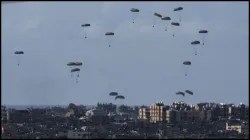Israel-Hamas war: Five killed, 11 injured after parachute fails to open during aid drop in Gaza
The US began airdropping humanitarian aid packages on Saturday into the war-torn Gaza amid a worsening humanitarian catastrophe amid the Israel-Hamas war. On Friday, the parachute on one of the aid packages failed to open and the parcel fell on the people below, killing five.

Gaza: At least five people were killed on Friday by a humanitarian aid package airdropped into the war-torn Gaza Strip after a parachute failed to deploy, causing the parcel to fall on them, officials from Gaza's Hamas-run ministry and an eyewitness told CBS News. The incident occurred in the Al-Shati refugee camp in northern Gaza, wounding 11 others.
Two boys were among the five people killed. The exact ages of the casualties were not clear, but those injured were said to be between 30 and 50 years old. This comes as the US, Jordan, Egypt, France, the Netherlands and Belgium dropped desperately-needed aid in Gaza amid a worsening humanitarian catastrophe following the five-month-long war, including a quarter of the population facing famine.
The US military denied that the fatalities were caused by the American airdrops in Gaza. "We are aware of reports of civilians killed as a result of humanitarian airdrops. We express sympathies to the families of those who were killed. Contrary to some reports, this was not the result of US airdrops," US Central Command said on social media platform X.
The US military carried out its fourth airdrop of aid into Gaza on Friday, delivering over 11,500 meal equivalents. The airdrops have been criticised by international aid agencies and others as wholly insufficient to meet the needs of the people of Gaza. The Israeli offensive in Gaza, supported by the US, has killed 30,000 Palestinians and displaced over 80 per cent of the enclave's 2.3 million people.
US airdrops in Gaza amid worsening crisis
The United Nations has warned of widespread famine among Gaza's roughly 2.3 million residents, and the global body's top humanitarian aid coordinator, Martin Griffiths, on Friday said in a social media post that the airdrops were a "last resort". US officials have acknowledged that the airdrops are not enough to meet the huge need in Gaza, but they are a sign that the world is not just standing by as a famine approaches.
"All those concerned about the situation in Gaza should put pressure on Israeli government to grant unimpeded humanitarian land access & not blocking convoys," the European Union's foreign policy chief Josep Borrell said Thursday, calling the airdrops "good but insufficient."
The US carried out its first humanitarian airdrop in Gaza on Saturday as aid agencies warned of a growing humanitarian disaster in the Palestinian enclave in the absence of a ceasefire deal, delivering 38,000 meals. The military dropped 36,800 meals on Tuesday and over 38,000 meals in its third airdrop in the Palestinian coastal enclave.
Meanwhile, US President Joe Biden has ordered the American military to set up a temporary port off the coast of Gaza, joining international partners in trying to carve out a sea route to deliver food and other aid to desperate Palestinian civilians cut off by the Hamas-Israel war and by Israeli restrictions on humanitarian access by land. However, the Pentagon said it would take up to 60 days and over 1,000 American troops.
Frustration between Netanyahu and Biden
President Joe Biden's growing frustration with Israeli Prime Minister Benjamin Netanyahu continues to mount, with the Democrat captured on a hot mic saying that he and the Israeli leader will need to have a “come to Jesus meeting". Asked if he thought Netanyahu should be doing more to alleviate the humanitarian suffering, Biden responded, “Yes, he does.”
Biden has become increasingly public about his frustration with the Netanyahu government's unwillingness to open more land crossings for critically needed aid to make its way into Gaza. In his State of the Union address on Thursday, he called on the Israelis to do more to alleviate the suffering even as they try to eliminate Hamas.
"To the leadership of Israel, I say this: Humanitarian assistance cannot be a secondary consideration or a bargaining chip. Protecting and saving innocent lives has to be a priority. As we look to the future, the only real solution to this situation is a two-state solution," he added.
(with inputs from agencies)
ALSO READ | Netanyahu says Israel will push on with offensive in Gaza's Rafah as ceasefire talks stalled